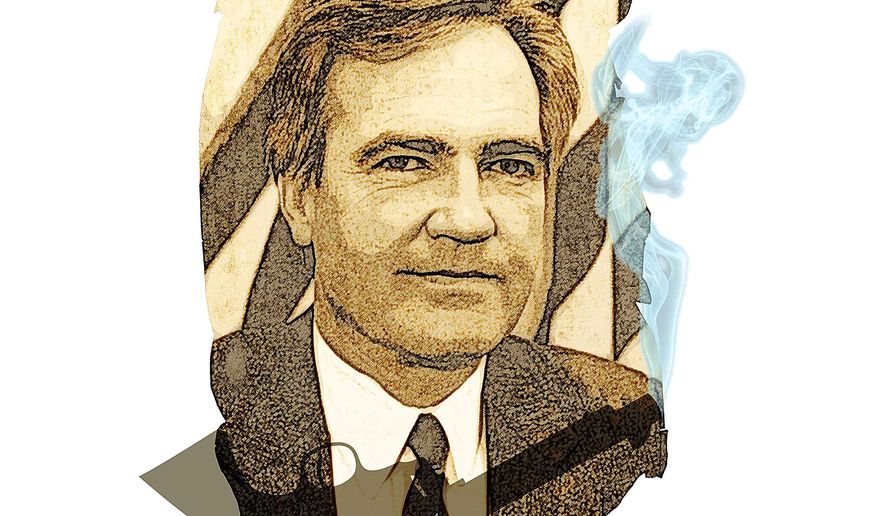OPINION:
Overlooked in the recent controversy over the death of Bill Clinton’s Deputy White House Counsel Vince Foster is the fact that FBI agents investigating the case found that Hillary Clinton triggered his suicide when she attacked and humiliated her mentor from their former Rose Law Firm in front of other White House aides a week before he took his own life.
The FBI investigation was conducted for independent counsel Kenneth W. Starr’s probe of the Clintons’ investments in the Whitewater real estate development.
While the exhaustive investigation found conclusively that Foster committed suicide, for unknown reasons, Mr. Starr elected to conceal the FBI’s findings about Hillary’s role in his death in his final report. But in interviews for my book “The First Family Detail,” the FBI agents revealed the truth about Foster’s death on July 20, 1993, when he shot himself at Fort Marcy Park along the Potomac River.
In interviewing Clinton White House aides and Foster’s friends and family, the FBI found that a week before Foster’s death, Hillary held a meeting at the White House with Foster and other top aides to discuss her proposed health care legislation.
Hillary violently disagreed with a legal objection Foster raised at the meeting and ridiculed him in front of his peers, former FBI agent Coy Copeland and former FBI supervisory agent Jim Clemente told me. Mr. Copeland was Mr. Starr’s senior investigator and read the reports of other agents working for Mr. Starr.
During the White House meeting, Hillary continued to humiliate Foster mercilessly, both former FBI agents say.
“Hillary put him down really, really bad in a pretty good-size meeting,” Mr. Copeland says. “She told him he didn’t get the picture, and he would always be a little hick town lawyer who was obviously not ready for the big time.”
Indeed, Hillary went so far as to blame Foster for all the Clintons’ problems and accuse him of failing them, according to Mr. Clemente, who was also assigned by the FBI to the Starr investigation and who probed the circumstances surrounding Foster’s suicide.
“Foster was profoundly depressed, but Hillary lambasting him was the final straw because she publicly embarrassed him in front of others,” says Mr. Clemente, who, like Mr. Copeland, spoke about the investigation for the first time.
“Hillary blamed him for failed nominations, claimed he had not vetted them properly, and said in front of his White House colleagues, ’You’re not protecting us’ and ’You have failed us,’ ” Mr. Clemente says. “That was the final blow.”
After the meeting, Foster’s behavior changed dramatically, the FBI agents found. Those who knew him said his voice sounded strained, he became withdrawn and preoccupied, and his sense of humor vanished. At times, Foster teared up. He talked of feeling trapped.
On Tuesday, July 13, 1993, while having dinner with his wife Lisa, Foster broke down and began to cry. He said he was considering resigning.
That weekend, Foster and his wife drove to the Eastern Shore of Maryland, where they saw their friends, Michael Cardoza and Webster Hubbell, and their wives.
“They played tennis, they swam, and they said he sat in a lawn chair, just kind of sat there in the lawn chair,” Mr. Copeland says. “They said that just was not Vince. He loved to play tennis, and he was always sociable, but he just sat over in the corner by himself and stared off into space, reading a book.”
Two days later, Foster left the White House parking lot at 1:10 p.m. The precise time when he shot himself could not be pinpointed. After Park Police found his body, they notified the U.S. Secret Service at 8:30 p.m.
Based on what “dozens” of others who had contact with Foster after that meeting told the agents, while Foster was already depressed, “The put-down that she gave him in that big meeting just pushed him over the edge,” Mr. Copeland says. “It was the final straw that broke the camel’s back.”
No one can explain a suicide in rational terms. But the FBI investigation concluded that it was Hillary’s vilification of Foster in front of his colleagues, coming on top of his depression, that triggered his suicide about a week later, Mr. Copeland and Mr. Clemente both say.
Mr. Starr issued a 38,000-word report, along with a separate psychologist’s report on the factors that contributed to Foster’s suicide. Yet Mr. Starr never mentioned the meeting with Hillary, leaving out the fact that his own investigation had found that Hillary’s attack had led to her friend’s suicide.
Mr. Starr never told Mr. Copeland or Mr. Clemente why he decided to exclude the findings from his report. But Mr. Clemente says, “Starr didn’t want to offend the conscience of the public by going after the first lady. He said the first lady is an institution.”
Asked for the reason he suppressed the material, Mr. Starr did not respond. A spokesman for Hillary Clinton had no comment.
• Ronald Kessler, a former Washington Post and Wall Street Journal investigative reporter, is the author of “The First Family Detail: Secret Service Agents Reveal the Hidden Lives of the Presidents” (Crown Forum, 2015).




Please read our comment policy before commenting.